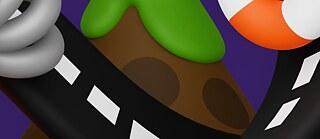Music and Motorways The very best highway songs
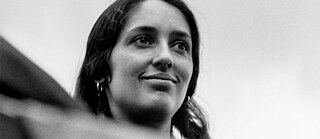
Babe, that highway’s a-callin’, sings Joan Baez. Songs about highways are the best of all. Jump in the car and pop a cassette in, our colleagues Andreas Ströhl in Johannesburg and Michael Krell in Montréal present their absolute favourite highway songs for your enjoyment. So wind down the window, feel the wind on your face, turn up the music and enjoy. It’s called freedom.
Andreas Ströhl: Highways of My Mind
I’m goin’ out on the highwayListen to them big trucks whine
(Townes van Zandt)
1. Terry Allen: Amarillo Highway (1979)
Terry Allen, a universal artist from Texas, speeds down Highway 87 operating as a card shark. He’s a pro, apparently emotionless.An’ I ain’t got no blood veins
I just got them four lanes
Of hard-ass Amarillo Highway
But his world is shattered. The man needs pills to escape from it all; he needs fast food and a whole lotta Texan beer, probably some cocaine too, which he snorts up like Jackson Browne and his broken white line: I got a broken white line (I’m still sober).
The lifeline: a line of coke, white lines on the road, a rescue rope and a live wire all in one. And don’t forget the sexual fantasy on the back seat.
There’s a girl in her barefeet
’Sleep on the back seat
Why does the song appeal to us? Because it doesn’t explain anything. It addresses us as a confidant, as a fellow player, as a Texan gambler, familiar with Plainview, Idalou and high straits. A ten-to-ace every time for 80-year-old gamester Allen – and a cold Lone Star!
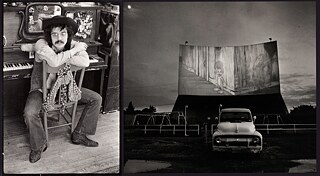
Terry Allen (Photo by Gary Krueger, Courtesy Paradise of Bachelors) and the Chalk Hill Drive-in Theater on Highway 80 in Dallas, Texas (gelatin silver print by Steve Fitch from 1973, Courtesy Smithsonian American Art Museum)
2. Hank Williams: Lost Highway (Payne, 1948)
And though I walk through the valley of the shadow of deathLifelines offer support in the face of temptation.
The road is long
And the road is hard
And many fall by the side
(Cave)
But President Eisenhower created an interstate highway system in the USA. Now it’s easy to go astray there. These highways shift into the foreground like some sort of optical puzzle, in a depiction of relationality, resembling arteries against a pale skin. They are real, the country they dissect is an illusion. Its expanse, its car culture and its Protestantism create a variety of temptations.
Just a deck of cards, and a jug of wine
And a woman’s lies makes a life like mine
Oh, the day we met, I went astray
I started rolling down that lost highway
Now it’s all too late, everything is lost.
And now I’m lost, too late to pray
Lord, I paid the cost on the lost highway
3. Joan Baez: Babe I’m Gonna Leave You (Bredon, 1960)
There’s no choice. It’s not about a failed relationship, for instance like the one in Don’t Think Twice It’s Alright. It’s simply that the highway is calling. It must be obeyed – in existential solitude, to be specific.Babe, that highway’s a-callin’
That old highway’s a-callin’
Callin’ me to travel on, travel on, out westward
Callin’ me to travel on alone
The call is addressed to the feet, not the mind.
My feet start goin’ down, goin’ down that highway
My feet start goin’ down, goin’ down alone
The temptation is irresistible. This restlessness, the longing for whatever might lie beyond the next hill, is what cost Hank Williams his life.
When that open road starts to callin’ me
There’s somethin’ o’er the hill that I gotta see
(Williams)
And this longing is no longer focused on the City Upon a Hill of the founding fathers. Now that the American Century has come to an end, it is pure transcendence. Directed towards a distant place, beyond the seven mountains.
4. Tom Robinson: 2-4-6-8 Motorway (1977)
This trucker classic from an England during the oil crisis includes the key motifs of the genre: nocturnal solitude and the longing for light and love – or at least sex. And of course, in a self-reflective way, music. Radio, the trucker’s friend, as enigmatic as the trucker bomb.Just me and my radio trucking on through the night
It’s strangely drug-free and without any irony. Day-to-day trucker life. And yet even in this simple song, the individual is portrayed as homo viator, always on an uncertain quest for the right way.
Ain’t nobody know when you’re acting right or wrong
No one knows if a roadway’s leading nowhere
Gonna keep on driving on the road I’m on
Keep on driving, despite all the doubt? That sounds uncertain: / don’t know when that road turned onto the road I’m on (Browne).
The highway is the path of life, the miles travelled are its fulfilment:
I’ve lived a life that’s full
I traveled each and every highway
(Sinatra)
You may bury my body
Down by the highway side
So my old evil spirit
Can catch a Greyhound bus and ride
(Robert Johnson)
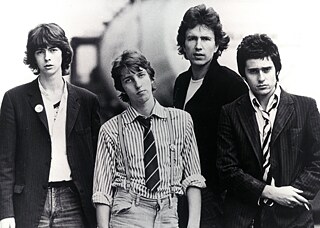
The Tom Robinson Band in 1977 (L to R Mark Amber, Brian Taylor, Tom Robinson und Danny Kustow) | © Picture-Alliance
Michael Krell: songs about departure and arrival
Like a ghost on the highwayOh, lost on the highway
(The Gun Club, Ghost on the Highway)
5. Paul Simon: Graceland (1986)
Hurt by the failure of his marriage, a not especially successful solo album, and the increasingly difficult relationship with his partner-in-crime Art Garfunkel, Paul Simon started his 1986 album Graceland with the title track about a trip he had done together with his 9-year-old son to Elvis Presley’s final resting place:I’m going to Graceland
For reasons I cannot explain
There’s some part of me wants to see
Graceland
The hope of finding remedy for a disjointed life at the end of this journey to Memphis is the secret ingredient of highway songs per se. Maps and GPS are superfluous to requirements, the land shows the way:
I am following the river
Down the highway
Through the cradle of the Civil War
And thus the stories of the past combine with one’s own and leave their impressions on the healing soul. What a shame the journey has to end at some point.
6. Iggy Pop: The Passenger (1977)
The urban speed thrill as a foggy delirium, the city lights at night and their raw beauty as a backdrop, driving around endlessly and aimlessly, fuelled only by whatever’s pumping through his veins and his Lust for Life, that’s what Iggy Pop experiences on this 1977 album – his second already – which was recorded in the Hansa Studios, Berlin.I am a passenger
And I ride, and I ride
The protagonist grandly describes his wanderings through an as-yet unfamiliar West Berlin, as a passenger in a friend’s car or on the S-Bahn, as an ode to life in a city split in two, in a setting characterised by the oil crisis, the Cold War and a culture shake-up that kicked off in the mid-seventies with punk. Against this backdrop of uncertainty and social change, nocturnal roaming is not an unadulterated pleasure, it’s more of a counter-revolutionary hedonism in difficult times.
He looks through his window
What does he see?
A few years later, with the master’s blessing, Siouxsie and the Banshees polished the raw track on their cover album Through The Looking Glass with a big fat brass section and their typically energy-filled mezzo soprano (lowest note C3).
7. Dr. Feelgood: Get Your Kicks On Route 66 (Bobby Troup, 1946)
If you ever plan to motor west,Travel my way, take the highway that is best.
Get your kicks on Route 66.
It doesn’t get any better. 2,000 miles along the best autoroute, hair blowing in the wind, with pit stops at rather insignificant places that became attractions for the sole reason that they were located along the famous Highway 66 in the USA – even though it has no longer existed in its original form for a long time. Of course the dream destination is beautiful California:
Won’t you get hip to this timely tip:
When you make that California trip.
There are more than 200 interpretations of Route 66 in existence, you come across illustrious names such as Nat King Cole, Bing Crosby, the Rolling Stones. But the version by English pub rocker band Dr. Feelgood stands out because of its iconoclastic energy. They belt out the fine rhythm & blues of the forties with a fury, as if trying to turn the sunny trip across the continent into a wild drinking binge. When you see singer Lee Brilleaux standing on stage in his grubby white suit and hear him screaming the words
It winds from Chicago to L.A.
More than two thousand miles all the way
Get your kicks on Route 66
into the crowd, the romantic image of the pompous joyride through the American paradise is brought back onto the true road, the road of dreamers and searchers.
8. Roy Orbison: I Drove All Night (Steinberg/Kelly 1987)
I had to escape, the city was sticky and cruelMaybe I should have called you first
But I was dying to get to you
This escape has love as its terminus, deliverance from the unbearable state of being apart. The adventure of travelling to his lover at night swirls in the mists of lust.
I was dreaming while I drove
The long straight road ahead
Desire is the driving force behind many road songs, but hardly any possess such fanatical energy as I Drove All Night, written by songwriter duo Billy Steinberg and Tom Kelly (Like A Virgin, True Colors) for American crooner Roy Orbison, although his recording of the song was only released posthumously in 1992. Cindy Lauper beat him to it in 1989; however her interpretation was not in the same class as the version by the Texan womaniser, who died in 1988 aged just 52.
I drove all night crept in your room
Woke you from your sleep to make love to you
Is that alright?
I drove all night
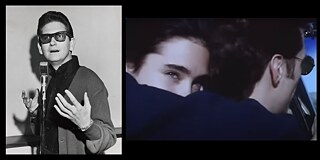
Portrait of Roy Orbison 1964 (left) and, on the right hand side, a scene from the music video of “I drove all night” with Jennifer Connelly and Jason Priestley | © National Portrait Gallery, Smithsonian Institution; acquired through the generosity of Sidney Hart
9. Tracy Chapman: Fast Car (1988)
You got a fast carIs it fast enough so we can fly away?
We gotta make a decision
Leave tonight or live and die this way
On a quest to fulfil her dreams – in Tracy Chapman’s Grammy-winning working-class ballad Fast Car, the road is the only way out of the hopelessness of poverty. The plans sound vague but ambitious.
Won’t have to drive too far
Just ’cross the border and into the city
You and I can both get jobs
And finally see what it means to be living
… but it goes wrong. The plan doesn’t work out, the owner of the Fast Car turns out to be a disappointment just like this highway, his promise a lie, he himself nothing but a dead end.
The songs of the highways have their ups and downs like this, with their tales of leaving and arriving, full of promises and rich in wonderful, painful or sensual experiences. Rarely is a destination reached or a solution found – but it doesn’t really matter anyway, it’s a big wide world so let’s just have another try; somewhere else. Singin` la la la la la la la la.
At the end of the road, you will
Find the answer
(The Distillers, Hall of Mirrors)

